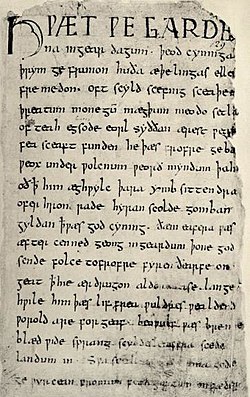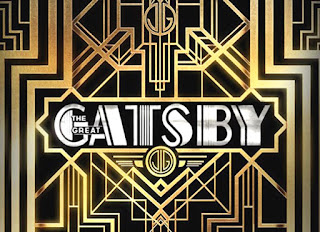In Which I Finally Read Beowulf
 So, today, I finished reading Beowulf for one of my English classes. In case you've never heard of it, Beowulf is an old English, epic-poem about a Scandinavian warrior named Beowulf. Most people think it's one of the most important works of Anglo-Saxon literature. Apparently, it's been quite a week for Anglo-Saxon poetry.
So, today, I finished reading Beowulf for one of my English classes. In case you've never heard of it, Beowulf is an old English, epic-poem about a Scandinavian warrior named Beowulf. Most people think it's one of the most important works of Anglo-Saxon literature. Apparently, it's been quite a week for Anglo-Saxon poetry.Anyway, as you know, I like Anglo-Saxon poetry, so I've tried to read it before, but I could never get through it. Which is weird, because it's not like it's a boring story or anything. It's actually a very good story. I tried to read it on my own before, and I've had to read parts of it for classes before, but it's very slow going. Anyway, when it was assigned for my English class, I decided that this time I was going to read it completely, no matter what.
Anyway, I started reading it and I found myself getting lost in the complicated prose, unpronounceable names, and references to obscure events. I realized that, normally, when I read, I don't read every word. I look at the sentence as a whole and pick out the important words without really thinking about it. Obviously, this is the way most experienced readers read. And, as an English major, I read a lot. The problem with Beowulf is that the sentence structure and the way the narrative is ordered makes it difficult to read that way.
So, I decided that the only way to really make myself read carefully and pay attention was to read it out loud to myself. And, I have to say, it worked really well. Generally, I don't like reading out loud because I tend to look ahead in the sentences and trip over the words, which means that I can't read as quickly as I do when I read silently. But, in this case, it was perfect.
Reading out loud also gave me an appreciation of the sounds of the poem. Apparently, Anglo Saxon poetry makes heavy use of alliteration, and I saw a lot of that in the poem. To that purpose, the author or authors of the poem also used some interesting vocabulary. Like, I think I read at least 10 different words and phrases that meant 'sea'. Like, they never just said the sea, it was always 'the whale way' or 'the sail road' or 'the swan road'. The whale road, I think that's a beautiful way of describing it. It makes modern English seem so plain in terms of vocabulary. There are also some Anglo-Saxon words that we don't really have equivalents to in our language, like 'wassail', which means 'good health', and 'weregild', which describes a blood-price placed on every human life. There are lots of other examples of cool words like that, but I don't want to spend a lot of time going into that.
My point is that it's really quite fun to spend a little time re-discovering an ancient text; also, it's quite fun to freak your roommate out by reciting Old-English poetry about slaying dragons and ripping the arms off of monsters at 10 AM in the morning.
Just readin'



Comments
Post a Comment